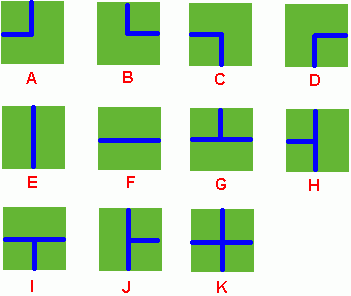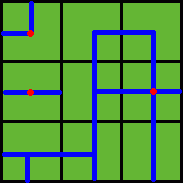C++_DFS求连通度
Description
Benny has a spacious farm land to irrigate. The farm land is a rectangle, and is divided into a lot of samll squares. Water pipes are placed in these squares. Different square has a different type of pipe. There are 11 types of pipes, which is marked from A to K, as Figure 1 shows.

Benny has a map of his farm, which is an array of marks denoting the distribution of water pipes over the whole farm. For example, if he has a map
ADC
FJK
IHE
then the water pipes are distributed like

Several wellsprings are found in the center of some squares, so water can flow along the pipes from one square to another. If water flow crosses one square, the whole farm land in this square is irrigated and will have a good harvest in autumn.
Now Benny wants to know at least how many wellsprings should be found to have the whole farm land irrigated. Can you help him?
Note: In the above example, at least 3 wellsprings are needed, as those red points in Figure 2 show.
Input
There are several test cases! In each test case, the first line contains 2 integers M and N, then M lines follow. In each of these lines, there are N characters, in the range of ‘A’ to ‘K’, denoting the type of water pipe over the corresponding square. A negative M or N denotes the end of input, else you can assume 1 <= M, N <= 50.
Output
For each test case, output in one line the least number of wellsprings needed.
思路
深度优先搜索,判断每一个节点与周围的节点是否连通。用一个vis数标记每一个节点是否被访问。每进行一次DFS结果就加1.直至最后vis中所有的值都为1
坑
1、方向数组和枚举之间的关系一定要清楚,卡了好久
2、数组下标总是写错,不仔细
代码
#include for(int j = 0;jif(!vis[i][j])
{
Dfs(i, j);
#ifdef DEBUG
cout << "======" << endl;
#endif // DEBUG
ans++;
}
printf("%d\n", ans);
}
void Input()
{
char t;
for(int i = 0;ifor(int j= 0;jcin >> t;
fram[i][j] = t-'A';
}
}
}
void Dfs(int x, int y)
{
if(x < 0 || x >= m || y < 0 || y >= n) return;
if(vis[x][y]) return;
vis[x][y] = 1;
for(int i = 0;i<4;i++)
{
if(isOk(x, y, i))
Dfs(x+dirx[i], y+diry[i]);
else
continue;
}
}
一次A了好开心!